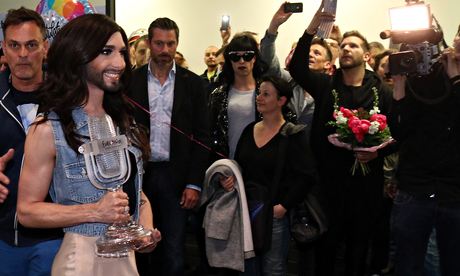
Bearded drag act Conchita Wurst, who secured Austria's first Eurovision win in 48 years, received a jubilant welcome home to Vienna on Sunday as she pledged to promote tolerance.
The singer, whose real name is Tom Neuwirth, was greeted at the airport by more than 1,000 fans, some wearing painted beards and singing the winning anthem Rise Like a Phoenix.
The 25-year-old, whose participation in the contest had sparked controversy before the Copenhagen final on Saturday, secured victory with 290 points amid a Twitter storm.
As her victory was announced, Twitter activity spiked at 47,136 tweets per minute, with the Eurovision song contest generating 5,384,678 tweets in total.
On the theme of tolerance, Wurst told reporters in the Austrian capital: "This will remain an issue for a long time and I fear I won't see the end of it in my lifetime. It will be my life's worth and I gladly take it on".
"It was not just a victory for me but a victory for those people who believe in a future that can function without discrimination and is based on tolerance and respect".
Fans waved Austrian fans and rainbow signs and banners reading "We love you!" and "Conchita Queen of Love + Tolerance", the news agency AFP reported.
Asked if she felt vindicated against her critics, Wurst said: "I don't really feel vindicated. I believe everything happens for a reason."
After performing her winning song for the final time in Copenhagen, Wurst had held the Eurovision trophy aloft and shouted: "We are unity and we are unstoppable".
In Vienna, she explained: "That was obviously meant for certain politicians whom we all know".
Asked if it was directed at Russian president Vladimir Putin, who last year signed a law banning "gay propaganda", Wurst replied: "among others".
The Netherlands finished second with 238 points, with Sweden in third place with 218 points. The UK's Molly Smitten-Downes came 17th with 40 points for her song Children of the Universe.
It was Austria's first win since 1966. One local radio station celebrated by playing Rise Like a Phoenix on loop 48 times over four hours on Sunday.
The Austrian president, Heinz Fischer, said it was "not just a victory for Austria, but above all for diversity and tolerance in Europe".
The current events in Ukraine and Russia's anti-gay legislation were acknowledged during Saturday's final with Russia's entry – The Tolmachevy Sisters – receiving boos from the audience during the results when countries, including Azerbaijan, awarded them the highest points. Russia ended the night in seventh place, with 89 points, just behind Ukraine with 113 points.
There was predictable outrage from some Russian conservative quarters at the results. Deputy prime minister Dmitry Rogozin wrote on Twitter that the Eurovision result "showed supporters of European integration their European future: a bearded girl."
Nationalist politician Vladimir Zhirinovsky said: "There's no limit to our outrage. It's the end of Europe. It has turned wild. They don't have men and women any more. They have 'it',".
The leader of the Liberal Democratic party, speaking on Rossiya-1 state television, added: "Fifty years ago the Soviet army occupied Austria. We made a mistake in freeing Austria. We should have stayed."

